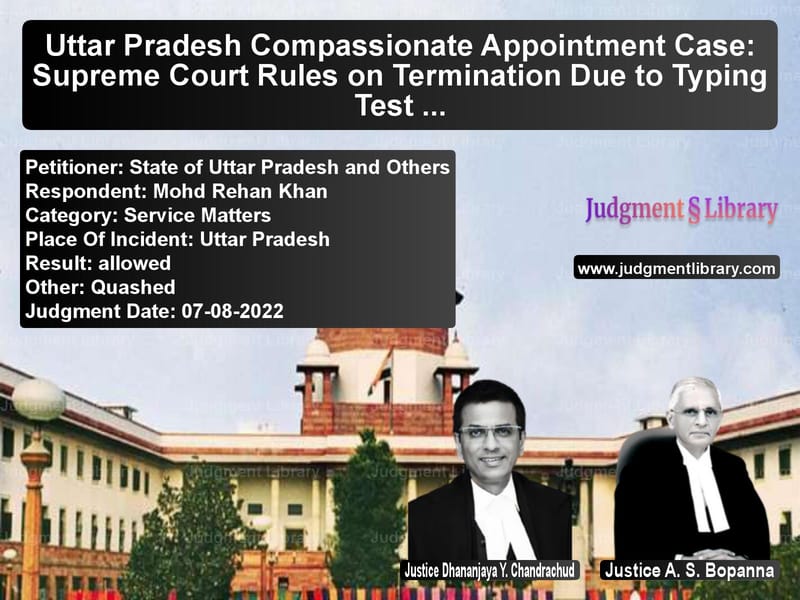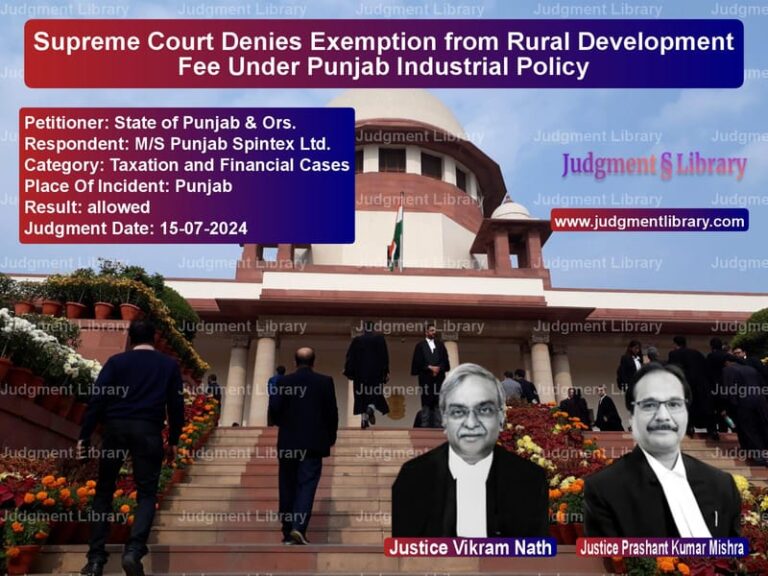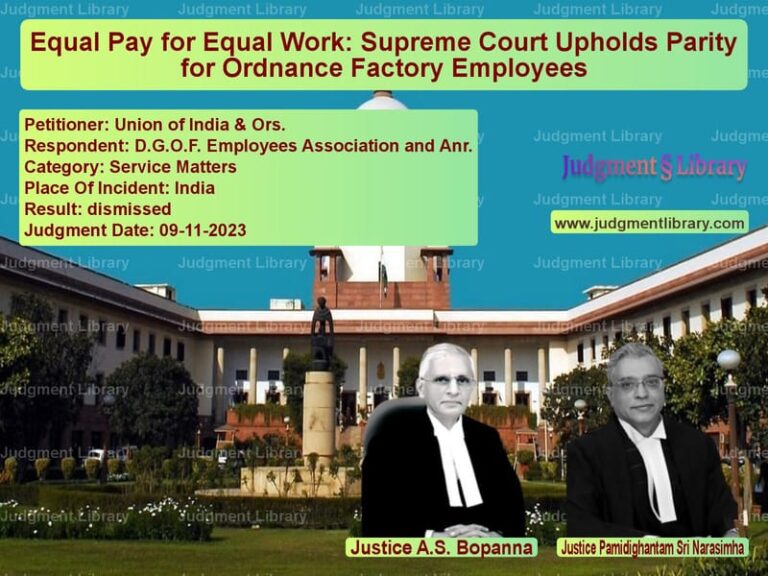Uttar Pradesh Compassionate Appointment Case: Supreme Court Rules on Termination Due to Typing Test Failure
The case of State of Uttar Pradesh & Others vs. Mohd Rehan Khan deals with the termination of a government employee appointed on compassionate grounds due to his failure to pass a mandatory typing test. The Supreme Court was called upon to determine whether the High Court was correct in directing that the terminated employee be considered for an alternative Class IV post. The judgment has significant implications for compassionate appointments and the conditions attached to them.
Background of the Case
The respondent, Mohd Rehan Khan, was appointed as a Junior Assistant in the Office of Economics and Statistics, Shahjahanpur, on a temporary basis under the Uttar Pradesh Recruitment of Dependents of Government Servants Dying in Harness Rules, 1974, as amended in 2014. His father, a government driver, had died in harness in 2015.
The appointment letter required him to acquire a typing speed of 25 words per minute within one year as per Rule 5(1) of the 2014 amendment to the Uttar Pradesh Recruitment of Dependents of Government Servants Dying in Harness Rules. The conditions stipulated that:
- If the candidate failed to achieve the required typing speed within one year, their general annual increment would be withheld, and an additional year would be granted.
- If the candidate failed to acquire the typing speed even in the extended period, their services would be terminated.
Mohd Rehan Khan failed the typing test twice—first in March 2017 and again in August 2019. Consequently, his services were terminated on 11 September 2019.
Arguments Presented
Petitioner’s (State of Uttar Pradesh) Arguments
- The respondent was fully aware of the typing test condition at the time of his appointment.
- Since he failed the typing test despite being given an additional opportunity, his termination was in accordance with the rules.
- The High Court erred in directing the authorities to consider him for a Class IV post as the scheme of compassionate appointments does not provide for automatic reassignment to another post.
Respondent’s (Mohd Rehan Khan) Arguments
- The respondent argued that he had cleared the computer proficiency requirement but faced difficulty in the typing test.
- He claimed that the computer system malfunctioned during his typing test, leading to unfair results.
- He relied on the Allahabad High Court’s ruling in Mukul Sagar v. State of Uttar Pradesh, which allowed employees dismissed for failing the typing test to be considered for a lower post.
High Court Rulings
Single Judge’s Decision
The Allahabad High Court ruled in favor of the respondent, citing its earlier judgment in Mukul Sagar v. State of Uttar Pradesh. The Single Judge held that:
- Since compassionate appointments are made to alleviate financial hardship, an alternative appointment in a Class IV post should be considered.
- The termination order should be revisited, and the authorities should explore the possibility of appointing the respondent to a lower post.
Division Bench’s Decision
The State of Uttar Pradesh appealed the Single Judge’s decision, but the Division Bench upheld the ruling, stating that considering the respondent for an alternative post was reasonable.
Supreme Court’s Observations
The Supreme Court, comprising Justice Dhananjaya Y. Chandrachud and Justice A. S. Bopanna, disagreed with the High Court’s reasoning and made several key observations.
On the Nature of Compassionate Appointments
The Court reiterated that:
“Compassionate appointment is an exception to Article 16 of the Constitution, which ensures equal opportunity in public employment. Such appointments are intended only to provide immediate financial relief to the dependents of a deceased government employee and must conform to the rules prescribed by the state.”
It clarified that once appointed, candidates on compassionate grounds are subject to the same service conditions as other government employees.
On Rule 5(1) of the 2014 Rules
The Court emphasized that:
“The appointment letter and Rule 5(1) of the 2014 Rules clearly mandated that the appointee must achieve a typing speed of 25 words per minute within the prescribed period. Failure to meet this requirement results in termination, with no provision for alternative employment.”
The Court held that the termination was legal and justified as the respondent had failed the typing test despite being given an extension.
On the High Court’s Error
The Supreme Court found that the High Court had incorrectly relied on the Mukul Sagar ruling, stating:
“The High Court’s interpretation that a failed candidate should be accommodated in a lower post is inconsistent with service rules. Appointment to a Class IV post would unfairly disadvantage other candidates awaiting compassionate appointments.”
Judgment and Its Implications
The Supreme Court:
- Allowed the appeals filed by the State of Uttar Pradesh.
- Set aside the orders of the Single Judge and Division Bench.
- Dismissed the writ petition filed by the respondent before the Allahabad High Court.
This judgment has several key implications:
- Strict Adherence to Appointment Rules: Compassionate appointees must meet the prescribed qualifications within the stipulated timeframe.
- No Automatic Reassignment: Candidates who fail to fulfill service conditions cannot claim an automatic right to reassignment.
- Fairness in Public Employment: Allowing reassignment would have given undue advantage to one individual at the expense of others awaiting appointments.
Conclusion
The Supreme Court’s decision in State of Uttar Pradesh & Others vs. Mohd Rehan Khan sets an important precedent in compassionate appointment cases. It underscores that candidates appointed under such schemes must meet all job-related requirements. The ruling ensures that compassionate appointments remain a mechanism for immediate relief rather than a means to bypass standard eligibility criteria.
Petitioner Name: State of Uttar Pradesh and Others.Respondent Name: Mohd Rehan Khan.Judgment By: Justice Dhananjaya Y. Chandrachud, Justice A. S. Bopanna.Place Of Incident: Uttar Pradesh.Judgment Date: 07-08-2022.
Don’t miss out on the full details! Download the complete judgment in PDF format below and gain valuable insights instantly!
Download Judgment: state-of-uttar-prade-vs-mohd-rehan-khan-supreme-court-of-india-judgment-dated-07-08-2022.pdf
Directly Download Judgment: Directly download this Judgment
See all petitions in Employment Disputes
See all petitions in Public Sector Employees
See all petitions in Recruitment Policies
See all petitions in Judgment by Dhananjaya Y Chandrachud
See all petitions in Judgment by A. S. Bopanna
See all petitions in allowed
See all petitions in Quashed
See all petitions in supreme court of India judgments August 2022
See all petitions in 2022 judgments
See all posts in Service Matters Category
See all allowed petitions in Service Matters Category
See all Dismissed petitions in Service Matters Category
See all partially allowed petitions in Service Matters Category







